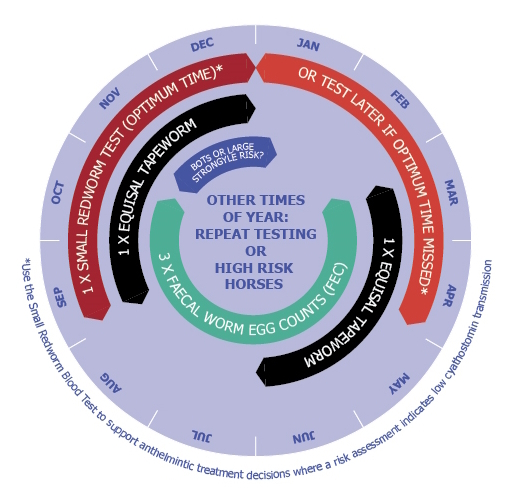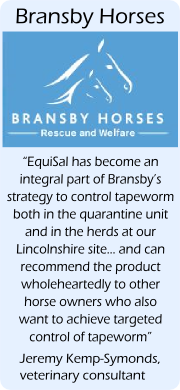Home The EquiSal Test How to test with EquiSal Tapeworm
How to test with EquiSal Tapeworm
Initial testing
We recommend that a horse has not been dewormed for 4 months before testing with the EquiSal Tapeworm Test.
Frequency of testing
We recommend that you test your horse twice a year for tapeworm.
The best time to test is during spring and autumn/early winter, as these are considered to be the ideal times of year to deworm for tapeworm. Only deworm your horse if testing recommends that treatment is required.
Include EquiSal Tapeworm testing every 6 months alongside regular faecal worm egg counts (FEC) for redworm and roundworm. Test for small redworm (including encysted stages) in Autumn/Winter.

Retesting after a borderline or moderate/high diagnosis
If a horse has had a previous borderline or moderate/high diagnosis, a retest can be carried out 3 months after deworming treatment for tapeworm. Our data shows that, in most cases, reduction in tapeworm-specific antibodies was seen within weeks following treatment.
How long after deworming are tapeworm-specific antibodies present in saliva?
Austin Davis Biologics carried out a pilot trial in which EquiSal Tapeworm testing was carried out on horses (with access to grazing) every two weeks following deworming treatment for tapeworm. Data collected from this trial showed that, in most horses kept in well-managed paddocks, reduction in tapeworm-specific antibodies was seen within two to three weeks following treatment. 73% of horses had Saliva Scores which dropped to low within five weeks of deworming for tapeworm. The remaining horses took a further six weeks to drop to low. This suggests that antibodies present in saliva have less memory of tapeworm infection than antibodies in blood.
It is important to understand that the situation is complicated if the horse becomes reinfected by tapeworm larvae after deworming treatment. Tapeworm reinfection has been seen in horses kept in poorly managed paddocks where reinfection can obviously happen very easily. But, given that the tapeworm’s life cycle requires an intermediate host (an oribatid mite), even well managed paddocks containing horses with high tapeworm burdens could harbour infected oribatid mites within the grass. This means that there is still a reinfection risk after worming for horses grazing in these circumstances too.
In summary, it is important to carry out regular testing to ensure that deworming strategies are effective and current data from EquiSal testing suggests that regular testing has an important part to play in monitoring effective worm control.
Please click here for the science behind antibody responses in saliva and blood.

